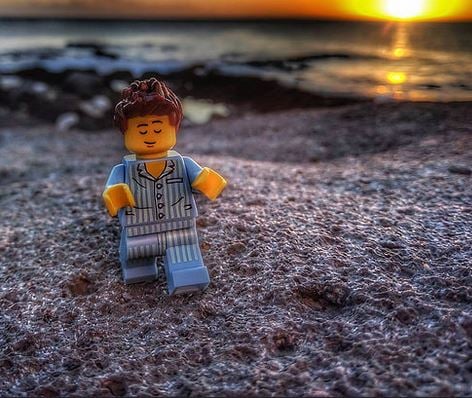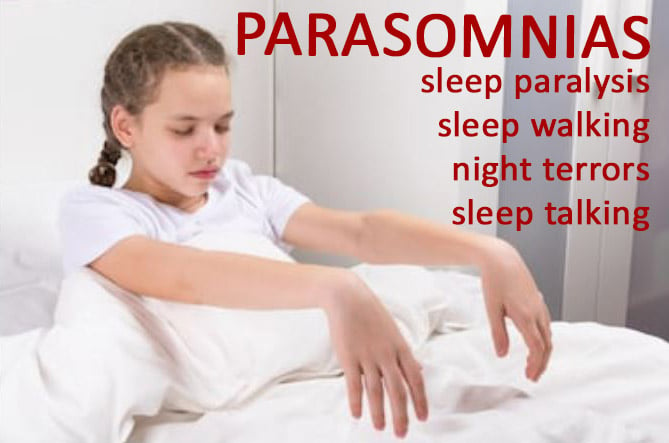What are Parasomnias?
A parasomnia is an abnormal (“para”) sleep (“somnia”) or sleep cycle (circadian rhythm). Parasomnias are considered disruptive sleep disorders that occur during sleep. The most common parasomnias are:
- Nightmares
- Night terrors
- Sleep walking
- Sleep talking
- Sleep paralysis
Parasomnias such as these can cause minor to severe sleep disruption. Let’s look at each of these parasomnias in more detail.
Nightmares vs Night Terrors
We’ve all had nightmares, and it’s pretty clear what they are: vivid dreams that cause feelings of fear, terror, anxiety, etc. As a parasomnia, significant nightmares usually result an abruptly awakening from REM sleep with distinct memories of the dream – returning to sleep after these experience can be difficult. These dreams are likely remembered the next morning as well.
Night terrors are a different type of parasomnia, though they are similar to nightmares. Night terrors involve awakening from sleep in a terrified and confused state. Those experiencing night terrors usually do not respond to voices and are difficult to fully awaken to consciousness. Naturally, witnessing the night terror of a loved one can be a troubling experience. People who experience night terrors usually don’t remember these events or the cause of the night terror.
So to summarize the similarities and differences between nightmares and night terrors:
- Causes sleep disruption?
- Night terrors: Yes
- Nightmares: Yes
- Consciously waken from sleep?
- Night terrors: No
- Nightmares: Yes
- Remember cause of disruption?
- Night terrors: No
- Nightmares: Yes
- Remember the actual disruption?
- Night terrors: No
- Nightmares: Yes
What is Sleepwalking
 Sleepwalking is most common among children, and poses it's own risks
Sleepwalking is most common among children, and poses it's own risks
Sleepwalking involves getting up and moving around while sleeping. During this state a person may actually appear to be awake, but they are actually asleep. Sleepwalkers may move around the house, or even leave the house, and do not remember their sleepwalking episodes.
Sleepwalking is not without risks, as the sleepwalker may be unaware of their surroundings and bump into things or fall. Contrary to rumor, waking a sleepwalker does not endanger them. It is, however, a good idea to wake them gently as they may be confused and/or agitated upon waking.
Sleepwalking is most common among children who are between 5 and 12, though it can occur among younger children, adults, and seniors as well [WebMD].
What is Sleep Talking
Sleep talking, or somniloquy is a real parasomnia that is not uncommon. Have you been told that you talk, whisper, shout, or babble in your sleep, or that you seem to wake up and say something only to go right back to sleep? If so, then you may be a sleep talker.
Sleep talking can involve harmless chatter, vulgar expressions, shouts, conversation-like talking, or whispering. This sleep talking is not likely to wake the talker, though it can be disruptive for people within hearing range, like a spouse.
Sleep talkers usually don’t remember sleep talking or what may have caused the sleep talking (such as a dream). Though it is considered a parasomnia, it’s usually not considered a medical problem.
What is Sleep Paralysis
Sleep paralysis is a frightening condition of being conscious but unable to move. It occurs when a person passes between stages of wakefulness and sleep, but during these transitions you find that you are unable to move for a few seconds to minutes. As if that weren’t scary enough, some people may also feel a sense of choking or pressure.
In the transition from sleep to waking, sleep paralysis is called hypnopompic or postdormital sleep paralysis. If it occurs as you are falling asleep it is called hypnagogic or predormital sleep paralysis.
There can be many causes for sleep paralysis, such as:
- Underlying sleep disorders like narcolepsy
- Lack of sleep
- Sudden changes in sleep schedule
- Mental conditions such as bipolar disorder
- Sleeping on the back
- Medications
- Substance abuse
Do Parasomnias Need Medical Attention?
Whether or not parasomnias need medical attention depends largely on the individual and the severity of the parasomnia. In general, parasomnias don’t need medical attention. That being said, they can sometimes be indicators of underlying and more serious medical/sleep disorders.
At the very least, if you suspect any of the above parasomnias are interfering with your sleep schedule and wellness, consult with your healthcare practitioner or a sleep specialist. If you click the link below, you can get in contact with our sleep clinic for further assistance.


